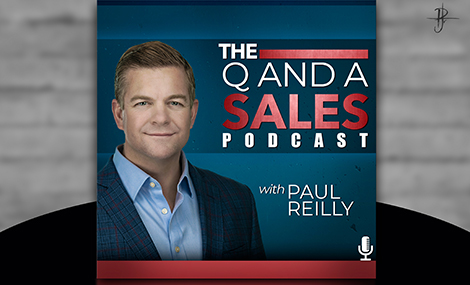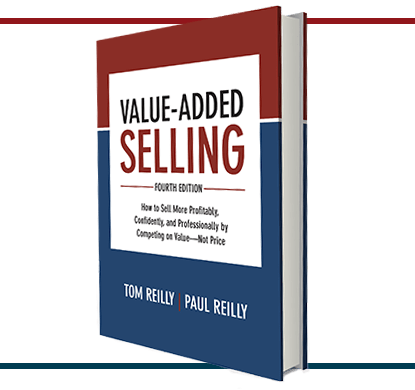Paul explains why you don’t want to discount…especially in tough times.
Show Notes
Don’t establish that discounting precedent. Today’s exception (in tough times) becomes tomorrow’s expectation (all the time).
Discounting devalues your solution.
Lead with your best price. Stick with your best price. It’s about integrity.
“Eating inflationary costs may leave you starving.”
Don’t discount. Instead, create more value for your customers.
Visit www.ToughTimer.com to get started on the 30-Day Tough-Timer Challenge!
Order your copy of Selling Through Tough Times from Amazon or Barnes & Noble!
Click here to purchase the latest edition of Value-Added Selling!
Mentioned in this podcast: Inc. Magazine, “Discounting is for Dummies.”
***
Thank you for tuning in. Our show is updated weekly with the questions you ask. So, please go to the home page to ask the question that you want answered.
Thank you to our production team at The Creative Impostor Studios.
Be sure to follow our show in your favorite podcast app and share this episode with a colleague or friend.
And most importantly…make it a big day.
Why is discounting a bad idea in tough times?
(Transcribed from podcast)
On today’s episode, we have a great question. That question is, “Why is discounting a bad idea in tough times?” Now, the reason, actually, I’m going through this podcast and answering this question is simple. I read an article the other day. The article appeared, I think it was in Inc. Magazine: “Discounting is for Dummies.” We’ll have the link to the article on this episode’s webpage. But what was interesting about this particular article is it talked about Warren Buffett and how Warren Buffet has a pretty unique philosophy when it comes to pricing. You know, he’s a pretty hands-off when they buy a company, but when it comes to pricing, he gets a little more involved. And he has a great, great reasoning as to why that is. So, check out that article. It’s going to be in the link for this episode’s web page.
You know, speaking of tough times, Selling Through Tough Times is now available. It’s on Barnes & Noble. It’s available through Chapters. It’s available through Amazon. Heck you can even call our office and we will get you a copy of the book if you need it. In Selling Through Tough Times, we talk about the buyer’s mindset and how that will shift during tough times, and how they will hoard their resources and they will ask for more discounts. Selling Through Tough Times is your go-to guide in how to manage and respond to those types of price objections. So pick up your copy today. Also, there’s more resources available, complimentary resources, actually, at toughtimer.com. There, you can actually download a couple of free chapters to the book. It’s there for you. Check it out.
So let’s get back to that question: Why is discounting a bad idea in tough times? In no particular order, I’m going to give you seven tips, seven reasons as to why discounting is a bad idea.
Reason number one why discounting is a bad idea in tough times: it establishes a discounting precedent. Even during the times we’re facing right now, where there are supply chain constraints, there’s inflation, there is a product just sitting on the port outside of Los Angeles. Even during these tough times, discounting is dangerous because it will establish a precedent. So, think about this, when a buyer receives a discount for every interaction, thereafter, you are risking them asking for another discount because they start to expect it. They come to expect it. Remember, today’s exception becomes tomorrow’s expectations, so we need to be very careful when we are deciding whether to discount or not, even in tough times, because it sets an expectation.
Number two: discounting de-values your solution. Remember that price is the greatest indicator of quality and performance. And just by the sheer fact that we were willing to discount and lower the price, it also means that we’re lowering the value in some way. It lowers that perceived value. And we’ve got to remember that, that when we do that, the buyer is going to look at our solution and they may start to question the value even. So we’ve got to be very aware of that, that discounting will de-value your solution.
And in some cases, you would never want to burden your customer with a discount in that sense. And here’s why I say that. I’ll give you an example of this, okay? I was getting ready to invest in a new development piece here at our office. And this was a significant investment that I was going to make for my business. Now, one thing I know about me is that the more I invest in something, the more I am committed to seeing it be successful. So think about this. If you have a piece of equipment that you’re going to sell, all of a sudden, you lower the price, you discount it, you’re de-valuing it to a certain extent that maybe that individual is less likely, less committed, rather, to seeing it all the way through, to seeing that project become successful, to see that piece of equipment gain the greatest return on their investment. Again, remember that discounting will de-value your solution.
Reason number three: discounting will destroy trust. It destroys trust, and this is pretty straight forward. When you lead with your best price and you tell the customer it’s your best price, and then you go back and discount it, you were essentially lying to them before. And I remember one salesperson in a training seminar demonstrated this. And he would tell the entire group that for him, pricing is an integrity issue. And he told customers—this one first-time customer— he said, “Look, here’s our best price.” The customer asked for a discount and continued to pry for the discount. And finally, the salesperson said, “Look, I’ve led with my best price. And if I were to discount right now, I was basically lying to you before. Why would you want to continue to work with me? We can’t build this long-term meaningful relationship on a lie. So, this is the best price.” That’s a salesperson who gets it.
And it’s an interesting perspective, because you’ve got to remember that once you tell your customers the best price, and then you discount, you effectively lied to them before. So be aware of that—that it’s an integrity piece.
Number four: remember that every time you discount, that is pure profit leaving your company. Let that sink in for a moment. Every dollar, every single dollar that you discount is pure profit leaving the company. And that’s why sometimes salespeople will say, “Well, it’s only 1 or 2%, or it’s only a 3% discount. It’s only a 4% discount.” Just remember that is pure profit leaving your company. And for the average company—for the average company with, let’s say average economy of scales, I should say for every bottom-line dollar of profit you discount, that’s like losing $12 of top-line revenue. So that should put it in real perspective. For every dollar you discount, you’ve got to go out there and find $12 more of revenue to make up for it. And you know, that addresses the old adage, “Hey, we’ll make it up in volume”. That’s a whole other podcast, because chances are you won’t be able to make it up in volume. But remember that that’s pure profit leaving your company.
Point number five: eating inflationary costs may leave you starving. This is what I’m hearing right now, as we are in an inflationary period where salespeople are saying, “Look, we’re going to try to eat this as long as I can.” The longer you eat inflationary costs, you may end up starving. Think about it, as your costs rise, your margins are shrinking. You are effectively discounting to your customers. Consider the long-term impact this will have on your ability to serve your customer. To serve the customers at the level they’re accustomed to, it takes a certain profit parameter to do so. And as soon as you start chewing away at that, you start losing some of your competitive edge in the marketplace, especially for those value-added organizations that rely on that profit to continue to reinvest into the business and to get better.
Stop eating those inflationary costs. Pass them along to your customer. And we’ll address that on a future episode, how you can introduce those “price adjustments” (as we like to call them, versus increases). Right now is an opportune time to do it. Your customers are getting price increases from everyone else. You don’t want to be last in line.
The next reason, number six, why discounting is a bad idea in tough times: your customers will develop a deal-hunter mindset. And there are several implications for that. This means they’re going out there, they’re hunting for deals maybe with your competition, or maybe they’re going to wait out their purchasing decisions. When customers start to receive discounts, they will naturally delay future buying decisions because they feel as though dragging their feet will help create an opportunity for discounts. So they’re either going to hunt for deals by elongating their purchasing process and delaying the purchasing process, or they’re going to be looking at your competition. So we’ve got to be aware of that. We could inadvertently be creating more competitive pressure by offering them a discount.
And then finally, reason number seven on why discounting is a bad idea in tough times. The reason it’s a bad idea is because there is a better option, and that better option is to create more value. Remember, I’ve said this so many times on this podcast, the number-one reason why buyers give a price objection is because they don’t believe it’s fair. It’s a perceived lack of equity. To close that gap, that equity gap between what is fair to the customer and the price they’re willing to pay, all you need to do is add more value. Look at complimentary services that you can offer your customer: offer additional training, offer additional products and services. Whatever you need to do, don’t discount your price, look for opportunities to add more value. Make the buyer aware of all the value that is part of your solution. And when they are aware of that value, it will seem fair.
Make it a big day.


